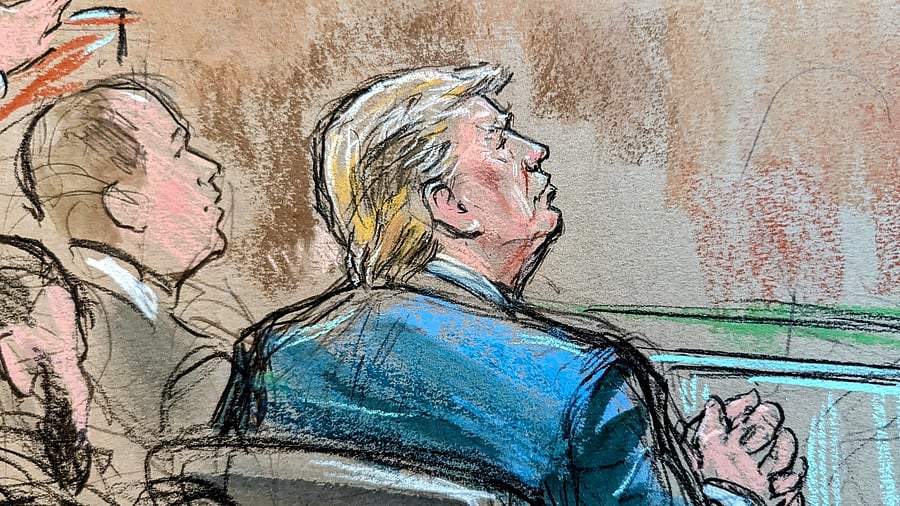
Former US President Donald Trump is seen during an appeals hearing.
Credit: Reuters Photo
By Timothy L. O'Brien
A federal appeals court made the obvious more overt in a landmark ruling on Tuesday: Donald Trump is not above the rule of law. He isn’t immune as a former president. He also wasn’t immune while in office. The law is the law, the court said, and every American is subject to it.
Trump, in just one of several prosecutions he is contending with, is charged by the federal government with illegally trying to overturn the results of the 2020 presidential election. He and his lawyers argued that he was exercising the powers of his office and asked that the court grant him sweeping immunity from criminal charges. They contended that this special status applied to Trump in and out office, an argument that would have allowed him and any presidential successors to act as flagrantly and illicitly as they wished. That interpretation would have had dire consequences for democracy and the separation of powers, and the court quite properly slapped it down.
The centerpiece of the court’s ruling is worth citing at length here:
“At bottom, former President Trump’s stance would collapse our system of separated powers by placing the President beyond the reach of all three Branches. Presidential immunity against federal indictment would mean that, as to the President, the Congress could not legislate, the Executive could not prosecute and the Judiciary could not review. We cannot accept that the office of the Presidency places its former occupants above the law for all time thereafter. Careful evaluation of these concerns leads us to conclude that there is no functional justification for immunizing former Presidents from federal prosecution in general or for immunizing former President Trump from the specific charges in the Indictment.”
A campaign spokesman said Trump would appeal this ruling, which will force the Supreme Court to weigh in. There are justices who’ve demonstrated an affinity for an imperial presidency, including Clarence Thomas and Samuel Alito. Trump’s reasoning may have traction with them. While I’m not in a position to handicap with any certainty, it would be hard to envision the rest of the court falling in line. We also already have a window into Chief Justice John Roberts’ view of the matter.
When Trump was contesting the right of law enforcement and Congress to gain access to his business records and income tax returns, those matters ended up before the Supreme Court as well. The court ruled in 2020 in one of the cases that prosecutors had a right to obtain the documents, batting down an argument from Trump’s attorneys that law enforcement faced a higher bar when seeking presidential records. Roberts, writing for the majority, cited previous rulings involving former Presidents Richard Nixon and Bill Clinton.
Trump’s argument “runs up against the 200 years of precedent establishing that Presidents, and their official communications, are subject to judicial process,” Roberts, an institutionalist devoted to the power of legal precedent, wrote.
In short, Roberts wrote, adopting the language from an 1807 Supreme Court ruling involving Aaron Burr and President Thomas Jefferson, every president’s legal standing is in “nearly the same situation with any other individual.”
“In our judicial system, ‘the public has a right to every man’s evidence,’” he added. “Since the earliest days of the Republic, ‘every man’ has included the President of the United States.”
In a separate opinion in 2020 on Congress’ right to secure Trump’s tax filings, Roberts also asserted that presidents don’t enjoy blanket immunity from records requests. The court also followed a similar line of legal reasoning in 2022, when it gave a congressional committee investigating the January 6 insurrection access to some of Trump’s records related to the probe.
So will Roberts suddenly have a change of heart and see Tuesday’s appellate court ruling as wildly out of line? I doubt it. And I expect that the other six justices will be similarly inclined.
If the Supreme Court upholds the appellate court ruling, Trump is going to face the January 6 charges head on. Special Counsel Jack Smith, the Justice Department lawyer prosecuting the case, has sought an expedited timetable, but the appeals process has slowed things down. Judge Tanya Chutkan, who is overseeing the case, said last week that she had to postpone the March 4 start date while she awaited a ruling on the immunity claims.
Timing will be everything in this monumental case. If the trial starts before the November presidential election, it may influence the outcome, even if a decision isn’t reached by then. Recent polls have suggested that voters will be swayed by guilty verdicts against Trump. If the trial starts after November, and Trump wins the election, he would likely try to have his own Justice Department dismiss the case against him.
Trump will undoubtedly feel cornered in the wake of Tuesday’s ruling, as he always has whenever pivotal matters don’t follow his preferred course. “This is all a political prosecution,” he tweeted in 2020 when the Roberts court ruled against his immunity claims. “Courts in the past have given ‘broad deference.’ BUT NOT ME!”
He’s also in uncharted waters. For all the talk about Trump’s ability to skirt the law throughout his career, he’s never faced the constellation of serious prosecutions confronting him now. That kind of pressure, especially because it’s novel, has usually caused him to unspool publicly.
In the interim, the appellate court has given the public words to live by.
“For the purpose of this criminal case, former President Trump has become citizen Trump, with all of the defenses of any other criminal defendant,” it noted. “But any executive immunity that may have protected him while he served as President no longer protects him against this prosecution.”
Hear, hear.